- Home
- Tim Lebbon
Ten-Word Tragedies Page 23
Ten-Word Tragedies Read online
Page 23
‘Then your account seems hard to credit. Honestly, Betty, I am at a loss. We will return to the hotel. You’ve postcards to send, to the Carrolls, and to Dr. and Mrs. Willits. And you’ll need to wash and change before dinner.’
Betty glanced up. The sun was still high in the sky, so dinner was hardly an imminent event. But her father had been reluctant to explore the city in the first place, and clearly needed but little persuasion to abandon the mission. They took a taxi cab, huge and black and noisy, back to the Pera Palace Hotel in Tepebaşı. The doorman, resplendent in a white and gold uniform with more buttons than fabric and more braid than either, saluted them with insane bravura as they went inside.
Betty and her father rode up in the elevator together, then separated to enter their rooms each by their own door. This was a ritual they always observed, even though the two bedrooms were part of the same suite, with a sitting room in between that belonged to both.
As she bathed and washed her hair, Betty replayed the whole incident again and again in her mind. Perhaps, after all, there had been no mysterious stranger who took her hand and ran or flew with her two hundred yards in the space of a breath. She was well known to be flighty, at the mercy of her own imagination. A fair proportion of the things she saw were demonstrably not there. And if, contrariwise, there had been such a person, where had they come from? A man (or woman) with pale skin and blond hair would be sure to draw attention wherever they went in Istanbul. Particularly in that grass-green coat. It had had long tails, Betty remembered, and a very wide collar of the kind that could be turned up against driving rain. Did it ever rain in Istanbul?
It had rained in Ireland, in the Vale of Avoca, where their grand tour had begun three weeks before. In a wild mood that had come from nowhere, Betty had gone out barefoot in the downpour. She had made her way across the field behind their rented cottage, to the stream, and then along its banks into a small copse of willow trees and silver birch.
She had gotten lost.
Then, out of nowhere, she had heard the sound of hoofbeats. It was a sound she had only heard before in Western movies: the images it conjured, therefore, were of wild natives and evil brigands. She did not know this country, or who or what one might suddenly encounter there. Afraid, she had hidden in thick bushes, head down, until the rider passed. She had had to wait a long time, for the horse slowed to a halt opposite her hiding place and stamped and whickered there for an interminable time before going on its way. From where she was kneeling she could very clearly see the rider’s feet, in long boots of faded brown leather. There was something about the look of those booted feet that made her earlier thoughts of wild men and bandits seem entirely appropriate.
As soon as she was alone again and had come out of the undergrowth, Betty felt ridiculous and ashamed. She had never mentioned her brief escapade to her father.
He had more than enough on his mind, without such digressions. Ireland was where Betty’s mother had come from, and Adrian’s mood had altered visibly as soon as they arrived. The main reason for their coming to Europe was ostensibly to provide a rest cure for Betty’s ailments both of the nerves and of the body, but Ireland had been included in their itinerary for other reasons. ‘You should be aware of your roots, on your mother’s side,’ Adrian had said. ‘I owe it to my dear, dead Mhairi.’
But they had not lingered long, and they had met nobody from Mhairi’s family. They were not to be found, Adrian said, at any of the addresses he had for them.
Thence to Amsterdam, Paris, Rome, Gallipoli, Troy. Never staying anywhere more than a day, and never doing more in any place than to take a desultory walk through its splendours and stand before one or two of the buildings that Baedeker said were not to be missed. Adrian seemed to want to take Europe at a dead run, the better to pretend once they returned to Cincinnati that they had never left. Whatever was driving him, it did not seem to be nostalgia.
Perhaps it was grief, but Betty did not believe so. Even in the months when his wife was dying, Adrian’s centre of gravity seemed already to have shifted. He had buried his head in the world, as ostriches are said to do in a bank of sand, so as not to see Mhairi fading away in front of his eyes.
Betty had had no option but to see. She had taken up the station her father abandoned, and held her mother’s hand until the last. Then, as if she were a runner in a relay race, she had begun to sicken herself.
The dust of the city had formed a film on the surface of her bathwater, which was no longer tepid but actually cold. She must have fallen into one of her long reveries. She got out and dried herself.
When she went back into her bedroom, she received another surprise on a day that already felt somewhat overstuffed with them. Lying on her bed, along with the evening clothes she had already laid out there, was a sculpture in silver or (much more likely) tin. It was not a model of the cathedral. It was a mounted figure, carrying a sword in one hand and a whip in the other. The tail of the whip was a filament of metal so slender and so beautifully recurved on itself that her eye lost itself among its involutions. It was altogether finer than anything she had seen for sale outside St. Sophia.
Still, where else could it have come from? And how had it found its way here, to her bedroom?
Her father’s knock on the outer door startled her from what might otherwise have been another prolonged trance of thought. Glancing at the clock, Betty realised that she had been staring at the lovely thing for more than ten minutes.
The knock was repeated. ‘Betty,’ her father called, ‘it’s time.’
He did not offer her his arm as they went down. She dimly remembered, when she was very small, climbing on his shoulders to touch the sky, something he assured her was entirely possible, and belabouring him with a pillow while he pretended to be the villainous Captain Hook from the story of Peter Pan. She could not remember when these games had stopped. And certainly it would not do to try to reinstate them now, when she was a young lady and Adrian was a figure in society.
A very small figure, admittedly. As the sole owner and manager of a firm that leased out agricultural equipment, he made a great deal of money but seemed to have a somewhat marginal social standing. Partly, Betty knew, this was due to his temperament, which was one of cold reserve. More recently it was also owing to his political opinions, not so much because they were extreme as because they were so very explicit. He could not keep from holding forth on them.
‘Thank you for my gift,’ Betty murmured as they went downstairs together, side by side but not touching.
Adrian seemed puzzled, and perhaps slightly irritated. ‘What gift?’
‘The horseman,’ Betty said. But she faltered as she said it. To leave the horseman where she had found it he would have had to come into her room. The logistics of this were not complicated, but judged from a psychological point of view it was implausible, if not impossible.
And was the figure a man? It was slender at the waist and full in the chest in a way that suggested it might not be. The Pontic Steppe was the ancient territory of the Scythian people, whose women warriors had inspired the legend of the Amazons. They favoured bows, though, controlling their horses with the muscles of their thighs and calves as they fired from the saddle.
‘Betty,’ Adrian snapped. ‘Please pay attention to me when I’m speaking to you. I repeat, I did not leave you any gift. To what are you referring?’
‘Nothing, Father,’ Betty said meekly. ‘I was in error. The item in question—a small, sculpted piece in white metal—must be part of the permanent décor of my room.’
Adrian seemed satisfied with this explanation. Or perhaps he ceased to question her because he had seen Herr Hartmann and Mr. Krug at the bottom of the stairs, deep in conversation. So they were to have company for dinner again. The two men had first crossed their path at Gallipoli and then again when they visited the ruins of Troy. The younger of the two, Mr. Krug, had paid Betty a few heavy-handed compliments on the first occasion and thereafter had ignored her. Fat,
avuncular Herr Hartmann was somewhat more amiable, though his jokes—invariably of the riddle-me-this variety—were extremely tiresome.
They turned now as Adrian hailed them. All three men shook hands cordially, and then the two Germans (German and Anglo-German, rather) bowed to Betty and said good evening to her. She acknowledged their courtesies with a smile and a bob of the head.
‘It’s a little early yet to sit down,’ Herr Hartmann said to her father. ‘Perhaps a small aperitif would be in order. I remember, Mr. Howard, you share my fondness for schnapps.’
Adrian hesitated, his gaze shifting to Betty. Even though this was a hotel rather than an inn or public hostelry, one might easily perceive an impropriety in a single woman sitting down to drink with three men. Observers would not necessarily divine that one of the men was her father, and might disapprove of the license even if they did.
‘I’ll take a walk in the gardens,’ Betty offered. ‘And join you at the table.’
‘Very well, Betty,’ Adrian said. ‘Take care not to leave the grounds.’
‘Yes, Daddy.’
The men moved away towards the hotel bar, already taking up again the conversation they had begun in Gallipoli and continued at Troy. It concerned the political philosophy of National Socialism, the future of the Aryan race and the coming war.
In the garden, although it was only April, gold-hearted chamomile was everywhere. There were anemones too, and bright purple irises with their flowers like the robes of tiny emperors. And somewhere nearby there must be a herb garden: Betty could smell both thyme and sage, so vividly that the scent was almost like a taste in her mouth.
In a corner of the garden, a long way from the hotel, there was a decorative arch in a wall of rough grey stone. Betty made her way towards it, deciding that it would mark the furthest point of her walk. As she drew close to it, though, her steps slowed. There was something strange and a little unsettling about the arch.
No, not about the arch, but the landscape beyond it. And not even the landscape itself, but the shadows. Betty could not entirely reconcile their direction with the angle of the sun, and they were somehow softer; as though on the far side of the arch a different sun shone on a different place. A place that was not Istanbul.
There was a grassy bank immediately beyond the arch. As Betty approached it, sidelong, she became aware of a figure sitting on the bank, his folded arms resting on his knees. He wore a long coat, and his hair was ash-blond.
Betty stopped a long way before the arch. The man acknowledged her with a nod and a flourish of his hand, smiling warmly.
‘Deoraí,’ he murmured. The accent was the same she had heard earlier at St. Sophia, musical and mysterious. There was a rich burr to the man’s voice. Betty thought that if she set her hand to his throat she would feel the vibration there when he spoke, as though bees lived inside his chest.
Not that she would, of course. Not that she would do that.
‘My name is not Deoraí,’ she said. ‘It is Betty.’
The man laughed appreciatively, as though she had uttered a clever bon mot. ‘Ah, well,’ he said, ‘I’ve no gift for their grunts and squeaks, so I can’t gainsay you.’
‘Did you come into my room?’ Betty asked him. ‘And leave a horseman there? If you did, it won’t make me like you any better, or agree to go with you. When I took your hand you tried to run away with me, and that was wrong.’
The man let his head hang down for a moment, as though in shame, but when he looked up at Betty again with his face aslant he was grinning most impudently. ‘It was that,’ he admitted. ‘The action of a rogue and a churl. But that’s my nature, deoraí, even when my mission is not so urgent. When it’s life or death, as it is now, I become downright sly and unmannerly.’
Betty was nonplussed. She could think of no apposite reply. ‘When I first saw you,’ she said, only to mark her place in the conversation, ‘I thought you might be a woman.’
The man’s outline wavered. He was a woman, Betty suddenly saw, with small, high breasts and a mouth so dark and rich a red it looked unsettlingly like a wound. ‘Today was not the first time you saw me,’ the woman said. ‘But you have the right of it, all the same. I might be anything, if I wished it, and so might you. It’s only sickness and staleness that keeps you so.’
Betty’s feet slipped a little on the gravel of the path. It descended more steeply towards the arch than she had realised. She shifted her balance. ‘I don’t know what you mean by that,’ she said.
‘No more than I say. Will you come with me now, if I promise to be more respectful of your person? I’ve something lovely to show you that will make you clap your hands and laugh like a little girl.’
Betty looked back towards the hotel. It seemed a long way away, suddenly.
‘What kind of something?’ she asked.
‘Something to delight you, surely. I’ll say no more than that.’
The gradient of the path made it difficult to stand upright. Betty was sliding forward, her planted feet leaving a double wake in the shifting gravel. She looked down, startled, and saw how steep the slope had become. In a matter of seconds it would be vertical and she would fall.
The archway loomed below her. Just beyond it, the woman threw open her arms. She gave a deep, mischievous chuckle. ‘I did warn you,’ she said. ‘I can’t see advantage and not take it, deoraí. I just can’t.’
Just before she lost her footing, Betty lunged forward with all her might. As the ground under her feet became a sheer cliff face, she kicked away from it in a clumsy, headlong jump, angled to her left. Instead of falling straight through the archway she hit the wall to one side of it, and stood for a second balanced on its brink with her arms turning windmills.
The pale woman was taken by surprise, but only for the merest moment. She threw out her hand to seize hold of Betty’s ankle. At the moment when they would have touched, gravity reasserted itself. Betty fell—not onto the gravel path but into one of the beds of irises planted right under the wall. She scrambled away from the archway, expecting the woman to come running through it and take hold of her again.
She stared in disbelief, and mild affront. There was no archway. The wall was unbroken. Not so the flowers, which she had all but destroyed. These innocent casualties of the attack on her dismayed her almost as much as the attack itself.
She returned to the hotel sullen and unhappy. Her father and his two associates had not yet finished their drink, and at another time she would have respected their privacy. As it was, she walked into their midst without ceremony.
The suddenness of Betty’s arrival startled them. Herr Hartmann in particular was severely discomposed. He had been in the process of showing her father the contents of a black leather valise. Rather than simply closing the bag when Betty arrived, he threw his own body across it as though he was trying to protect it from her, or her from it.
‘I am very sorry to disturb you,’ she said. ‘Father, I saw the man again. The man from this afternoon, at St. Sophia.’ She decided to avoid any mention of the fact that the man had turned into a woman, feeling that it weakened her case.
But even with that omission Adrian was not convinced. ‘There was no such man,’ he snapped. ‘Betty, I’m surprised at you. You should know better than to interrupt a conversation between gentlemen without either invitation or announcement. Wait for us in the restaurant. There is a table reserved under my name.’
Utterly humiliated, Betty could manage no more than a muttered ‘Yes, Father,’ before she turned and fled.
The mâitre d’hotel, recognising her as her father’s daughter, was very pleased to seat her. He brought her an amuse-bouche of mashed aubergine with spicy bread to dip in it, and ice water flavoured with rose petals. It was delicious, but did little to lift Betty’s misery. She ate and drank desultorily until her father and the other men finally came to join her more than twenty minutes later.
‘I am sorry, Betty,’ her father said as he seated himself, ‘that I was s
o peremptory with you. You must understand, we were discussing serious matters.’
‘Of course, Father,’ Betty said.
‘I hope I did not upset you.’
‘Not at all.’ She had composed herself. The lie could not be read on her face.
‘It falls to some of us to be busy,’ Mr. Krug said brightly, ‘while others need only be beautiful. You must forgive us all, Miss Howard. We know this visit is in the nature of a rest cure for you. But not for your father, alas.’
Betty forced a smile. It was the first of many. The evening wore on, dreadful and indivisible. The three men talked about Germany, and the wonderful things that were being done there. ‘The Führer has united the people behind a single vision,’ Herr Hartmann enthused. ‘That, in itself, is the miracle—that he perfectly embodies the Aryan volk, and that they find themselves completed and expressed in him.’
‘I find his manifesto, as set down in Mein Kampf, entirely convincing,’ Adrian said. ‘Unanswerable, even. Final in the way that all great truths are final. Yet the American press continues to dwell on the negatives.’
Mr. Krug made a nasal sound of contempt, like a snort. ‘To invent the negatives, you mean. Because the Jews control the media, just as they control the banks. They will say anything, do anything, to prevent America and my own dear Britain from making common cause with Germany.’
‘They cannot prevent it,’ Herr Hartmann averred. ‘They can only delay it. And not for much longer. If our program goes forward as we intend—’
‘We must order more wine,’ Mr. Krug interjected quickly. ‘This bottle is almost finished.’
His eyes were on Betty as he said this. Perhaps he was afraid to say too much in front of a relative stranger. In fact she was hardly attending to what the men were discussing. She was thinking about her abductor, who wore green and changed sex on a momentary whim. Had she also been the one to leave the metal figure in Betty’s room? And if so, why?
There was a great deal more canvassing of the German miracle, and a great deal more wine. Mr. Krug intervened more often as the evening progressed, turning the conversation whenever it threatened to become too specific about what Herr Hartmann called ‘the program’ and her father called ‘the schedule’.

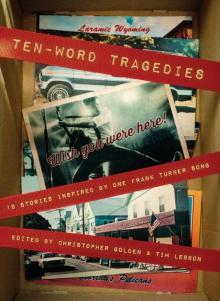 Ten-Word Tragedies
Ten-Word Tragedies Predator: Incursion
Predator: Incursion Relics--The Edge
Relics--The Edge Firefly
Firefly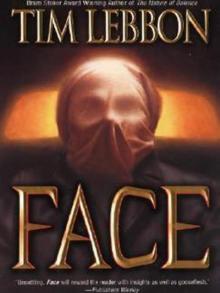 Face
Face Generations
Generations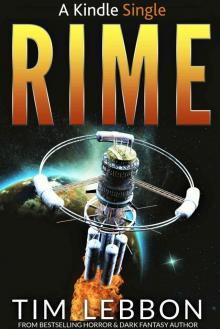 RIME (Kindle Single)
RIME (Kindle Single) Fallen
Fallen London Eye tc-1
London Eye tc-1 Kong: Skull Island
Kong: Skull Island Dawn n-2
Dawn n-2 Into the Void: Star Wars (Dawn of the Jedi)
Into the Void: Star Wars (Dawn of the Jedi) The Everlasting
The Everlasting London Eye: 1 (Toxic City)
London Eye: 1 (Toxic City) Dusk: a dark fantasy novel (A Noreela novel)
Dusk: a dark fantasy novel (A Noreela novel) Coldbrook
Coldbrook Alien
Alien Dusk
Dusk The Cabin in the Woods
The Cabin in the Woods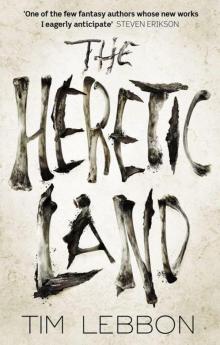 The Heretic Land
The Heretic Land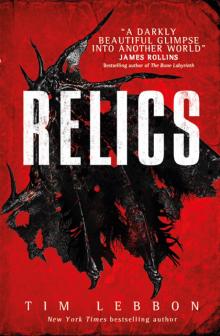 Relics
Relics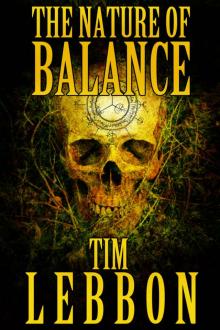 The Nature of Balance
The Nature of Balance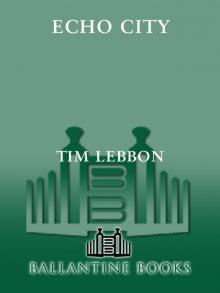 Echo City
Echo City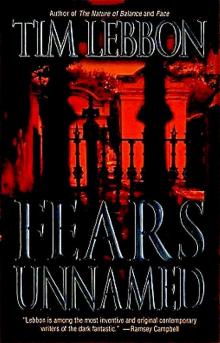 Tim Lebbon - Fears Unnamed
Tim Lebbon - Fears Unnamed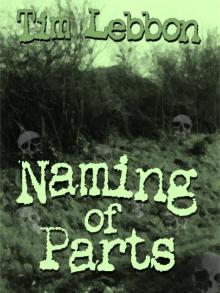 Naming of Parts
Naming of Parts Alien--Invasion
Alien--Invasion Vale of Blood Roses
Vale of Blood Roses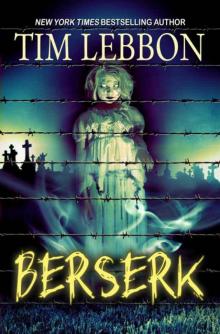 Berserk
Berserk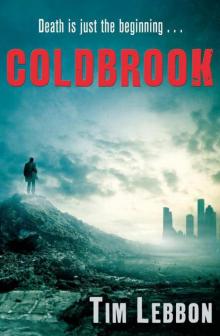 Coldbrook (Hammer)
Coldbrook (Hammer) Contagion tc-3
Contagion tc-3 Reaper's Legacy: Book Two (Toxic City)
Reaper's Legacy: Book Two (Toxic City)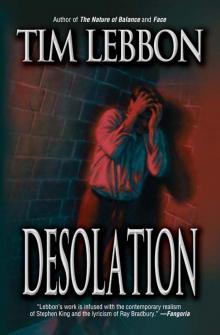 Desolation
Desolation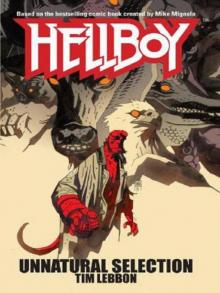 Unnatural Selection
Unnatural Selection Predator - Incursion
Predator - Incursion London Eye
London Eye Contagion (Toxic City Book Three)
Contagion (Toxic City Book Three) The Silence
The Silence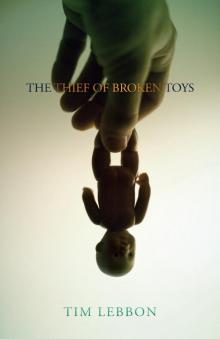 The Thief of Broken Toys
The Thief of Broken Toys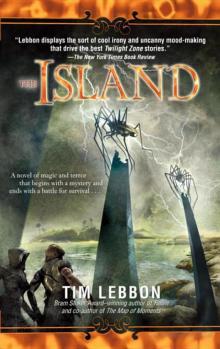 Tales of Noreela 04: The Island
Tales of Noreela 04: The Island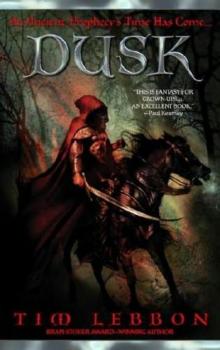 Dusk n-1
Dusk n-1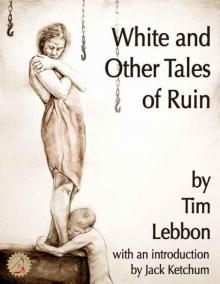 White and Other Tales of Ruin
White and Other Tales of Ruin A Whisper of Southern Lights
A Whisper of Southern Lights Until She Sleeps
Until She Sleeps Relics--The Folded Land
Relics--The Folded Land Reaper's Legacy tc-2
Reaper's Legacy tc-2 Alien: Out of the Shadows
Alien: Out of the Shadows Pieces of Hate
Pieces of Hate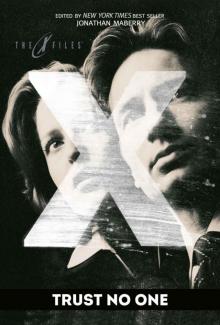 X-Files: Trust No One
X-Files: Trust No One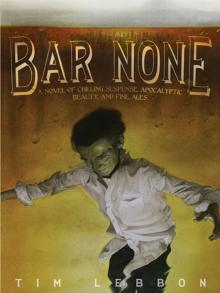 Bar None
Bar None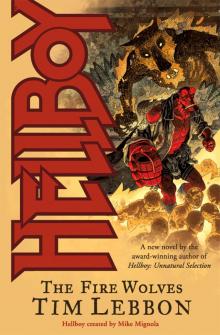 The Fire Wolves
The Fire Wolves